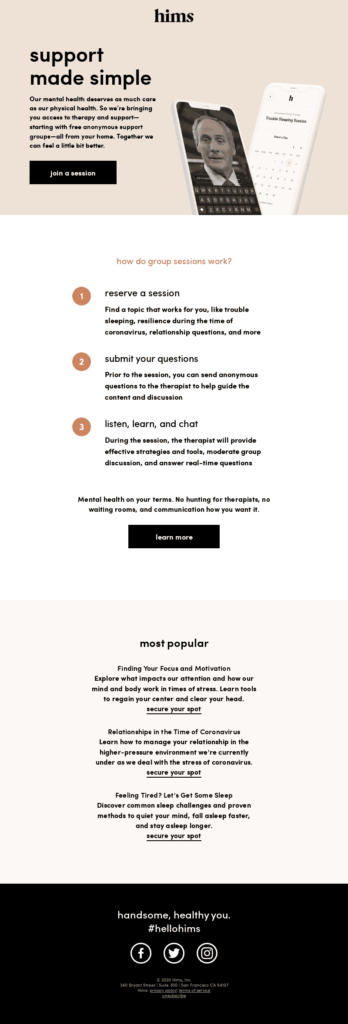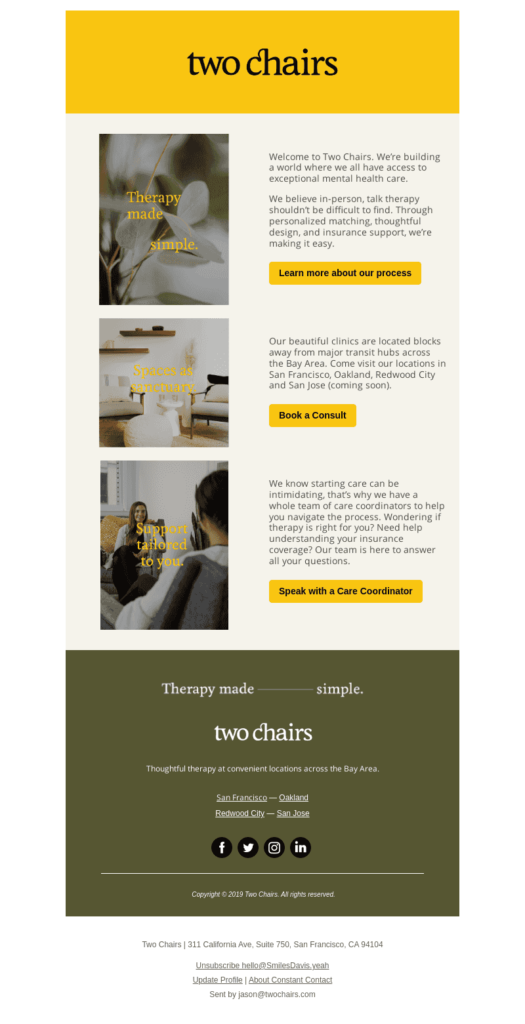Empowering Blocks Therapist Email Templates
Are you a practitioner looking for therapist email templates? Resort to our gallery of therapist email templates and customize them in a drag-n-drop editor. Our email templates will look amazing on any device and ESP. No coding required. These template are fully integrated with popular ESPs that work with HTML.
As a private therapist, you might be dealing with a large number of clients, and managing their appointments, sessions, and follow-ups can be a challenging task. One way to optimize your communication with clients is by using therapist email templates. Our responsive therapist email templates can save your time, ensure consistency, and maintain professionalism in your communications with clients.
Looking for an effective tool to create Therapist emails?
Give Blocks a try for free today
The Importance of Therapist Email Templates
We are all human beings. We can’t be everywhere at the same time and do everything simultaneously. If there is an opportunity to cut some corners and skip repetitive tasks, why not take it? The same goes for private therapist emails.
Here are some reasons why using therapist email templates is essential:
- It saves your time. Creating a therapist email template for frequently sent emails such as appointment reminders, rescheduling, cancellations, and follow-ups can save you tons of time. You can customize and personalize the templates as needed, and spend less time doing the same email each time.
- They are consistent. Using therapist email templates ensures consistency in your communication with clients. By using a standardized template, you can feel safe that all important information is included in every email you send, and nothing is missed or forgotten.
- Keeping it professional. Using therapist email templates instead of building these emails from scratch each time will help you maintain a professional image with your clients. These templates will show that you are organized and reliable, and that you take your communication with clients seriously.
Another benefit of therapist email templates is that they can help you manage client expectations. For example, if you have a policy that requires clients to cancel appointments at least 24 hours in advance with no charge, you can include that information in your appointment reminder template. By doing so, you are reminding clients of your policy and helping to prevent missed appointments.
How To Create an Effective Therapist Email Template
If you want to try and create an effective therapist email template yourself, here are some advice on how to do it:
- Identify the types of emails you frequently send. The first step in creating a therapist email template is to identify the types of emails you send most often. For example, you might send appointment reminders, cancellations, rescheduling, or follow-up emails. Once you have identified the most common types of emails, you can start building your own therapist email templates.
- Keep it brief and to the point. Your email templates should be concise. Don’t waste your clients’ time, be straight. Avoid using jargon or technical language, and stick to plain and simple language that is easy for clients to understand. Keep in mind that clients may not be familiar with the terms or concepts you use, so it’s essential to explain things clearly.

- Use the professional tone. It’s important to sound professional in your emails, even if you have a friendly relationship with your clients. Your email templates should be polite, respectful, and friendly, without being too casual or informal.
- Don’t overcomplicate the design. The design of your email template is as essential as its copy. Don’t go into crazy colors and patterns, make use of white space, resort to soft colors and simplistic fonts. No need to turn your therapist email templates into a bright and frenzy carnival. You can also add a professional email signature to your templates, including your name, title, and contact information.
- Test your templates. Before sending your emails to your clients, always test your therapist email templates, it’s essential. Send a test email to yourself to make sure that all the information is accurate and that the email looks clean and professional.
When creating your therapist email templates,keep in mind that they should be adaptable to different situations. While you may have a therapist email template for appointment reminders, there may be times when you need to customize it for a specific client. In such cases, a template that can be easily modified to include the necessary information comes in handy.
Keep in mind that it’s important to consider accessibility. Some clients may have visual or hearing impairments, so you should ensure that your templates are easy to read and that any audio or video content is captioned or transcribed. And don’t forget alt texts for the images.
Most Common Therapist Email Templates Mistakes
We all make mistakes. It’s okay. But when it comes to creating therapist email templates you need to stay extra cautious to not make any mistakes, as these emails touch upon people’s health. Now let’s discuss some common mistakes to avoid when creating therapist email templates:
- Going into personalization. Your therapist email templates don’t need to be personalized to every client. The thing is, people don’t expect getting completely personalized emails from their therapist. These emails are more on the practical side, to arrange a meeting or send a drug order, for example. No need to personalize them.
- Overloading the email. While it’s important to provide clients with all the data they need, avoid overwhelming them with too much information and/or design elements. Stick to the essential details and keep your therapist email copy brief & to the point.
- Forgetting to proofread. As we said earlier, you need to double check everything when creating a therapist email template. It goes for any part of the email, including the copy. Before sending any email to a client, it’s essential to proofread it carefully. Typos, spelling mistakes, and grammatical errors can make you appear unprofessional and careless, or even lead to some unfortunate consequences.
- Using the unprofessional tone. Private specialists have to be professional, just like any physician. It’s important to maintain a professional tone in your emails, even if you have a friendly relationship with your clients. Avoid being too informal or using slang.
- Using humor in any form. Just don’t. Therapist emails are not the best place to use humor.
Conclusion
In conclusion, therapist email templates are a valuable tool for private therapists looking to streamline their communication with clients. They save time, ensure consistency, and maintain a professional image. By following the tips outlined in this article, you can create effective email templates that help you manage client expectations and build a strong communication with your clients.
Boost your Therapist templates with Blocks!
Sign up now to craft your effective Therapist email templates!

